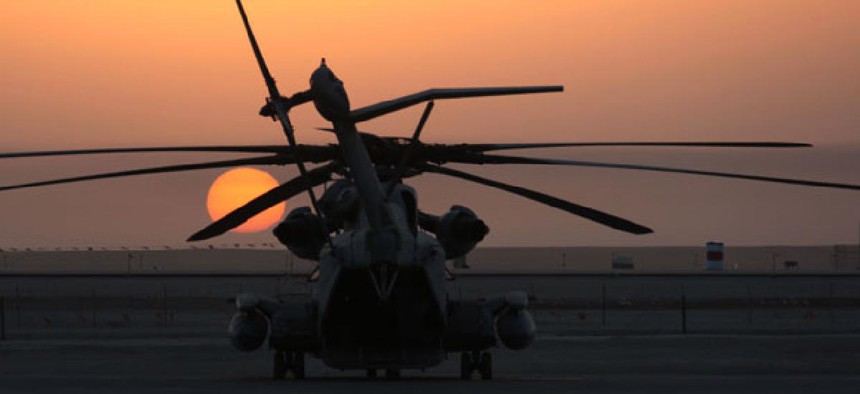
The sun rises over a CH-53E Super Stallion in Afghanistan in 2010 Defense Department file photo
Analysis: How Obama Fumbled Afghanistan
A new account by Richard Holbrooke's deputy hits the president hard on foreign policy.
Until he took the job as President Obama’s special representative, Richard Holbrooke was known as one of the toughest, smartest, and most nimble diplomats of his era. He had plenty of ego, but few people doubted Holbrooke’s effectiveness.
So what happened to make Holbrooke so seemingly ineffective in dealing with Afghanistan and Pakistan in the years leading up to his sudden death in December 2010? Vali Nasr, a Johns Hopkins University professor who served as Holbrooke’s deputy, writes in a new book, The Dispensable Nation, that the main cause of Holbrooke’s difficulties was politics inside the Obama administration and, in particular, a White House that actively stymied him. This was especially true when it came to Holbrooke’s most important initiative: a bid to open up talks with the Taliban while the United States and NATO still had large numbers of troops in the country and, therefore, leverage, and before Obama’s announced the U.S. withdrawal.
Nasr’s account of his and Holbrooke’s frustrations holds up well to scrutiny. Holbrooke was pushing for talks with the Taliban back in 2009, but he made little headway with the White House that year or the next, according to several officials other than Nasr. Until he died, Holbrooke was trying to get the administration to see the larger picture, his widow, Kati Marton, told me last May. “He was pushing reconciliation with the Taliban when no one wanted to hear about it,” she said. “He knew that ultimately they would have to come to him to negotiate.”
But, as Nasr writes, “the president failed to launch diplomacy and then announced the troop withdrawal in a June 2011 speech, in effect snatching away the leverage that would be needed if diplomacy were to have a chance of success.” Nasr also writes that “the president had a truly disturbing habit of funneling major foreign-policy decisions through a small cabal of relatively inexperienced White House advisers whose turf was strictly politics. Their primary concern was how any action in Afghanistan or the Middle East would play on the nightly news, or which talking point it would give the Republicans.”
There is a lot to this as well, says another intimate of Holbrooke’s who was familiar with his thinking at the time. “The president was not at all interested in [Holbrooke’s] long game,” said this friend. “The people who run this administration are same ones who got Obama elected.... [Holbrooke] was up against a bunch of former congressional staffers and former campaign operatives who had just pulled off this magnificent feat, and they were going to run the presidency as they ran the campaign.”
As I wrote last May after a trip to Afghanistan, quoting observers inside and outside the administration other than Nasr, Holbrooke was intensely frustrated by White House interference; he felt curtailed in his actions by then-National Security Adviser James Jones and a coterie of close aides around Obama. This was especially true when Holbrooke sought to tackle the larger regional issues, in particular the tense relationship between India and Pakistan, which the Pakistani military and ISI use to justify their support of Islamist radicals. The White House denied his request to make India and specifically Kashmir part of his portfolio, although that disputed province, situated between Pakistan and India, has given birth to numerous Pakistan-supported jihadist groups. Nor did Holbrooke get support from the White House when he sought to confront Afghan President Hamid Karzai over corruption, critics say.
It will never be known, of course, whether a grand opportunity for diplomatic success was missed. The Taliban has passed up several opportunities since to negotiate. At the same time, reconciling seemingly irreconcilable adversaries was a Holbrooke specialty, as long as he had support from the White House. This was true during the Clinton administration. Indefatigable in the clinches as a negotiator, Holbrooke was known as “the bulldozer.” When Bosnia’s civil war looked intractable, Holbrooke brought all the parties to Dayton, Ohio, where he essentially locked them up until they arrived at a deal. Later, as U.N. ambassador, negotiating a giant dispute over dues owed to the United Nations, Holbrooke managed to patch things up between two groups that were almost as hostile to each other as the former Yugoslav factions were: Republicans in Washington and U.N. bureaucrats in New York City. ( “Boy, did it come down to the wire,” Holbrooke recalled to me about the latter, lesser-known negotiation. “Five straight nights of negotiating.... Very much like the last day of Dayton.”)
One key to Holbrooke’s success at both Dayton and the U.N. was full support from the White House and a freedom to make executive decisions—a latitude that, as Obama’s special representative, he was supposed to have had. But it didn’t work out that way. In his memorial speech about Holbrooke in January 2011, Obama told the diplomat’s family that he was “personally grateful” to them because “I know that every hour he spent with me in the Situation Room … was time spent away from you.”
But, in fact, Holbrooke spent very little time with Obama. As Nasr writes, “Holbrooke knew that Afghanistan was not going to be easy. There were too many players and too many unknowns, and Obama had not given him enough authority (and would give him almost no support) to get the job done. After he took office, the president never met with Holbrooke outside large meetings and never gave him time and heard him out. “
Nasr also writes of Hillary Rodham Clinton’s frustrations as secretary of State. “Both Clinton and Holbrooke, two incredibly dedicated and talented people, had to fight to have their voices count on major foreign policy initiatives,” he says. This is largely true as well, based on my reporting and other accounts. Obama himself, when asked by CBS’s Steve Kroft in a farewell interview with Clinton what the biggest foreign policy achievement of his first term was, gave an answer that inadvertently confirmed that his secretary of State was just another player. “For us to be able to wind down one war, to be on the path of ending a second war, to do that in a way that honors the enormous sacrifices our troops have made, to sustain the pressure on al-Qaida and terrorist organizations so that not only did we avoid a significant terrorist attack on the homeland, but we're able to dismantle the core leadership of al-Qaida. That's all a consequence of the great work that Hillary did and her team did and the State Department did in conjunction with our national security team,” Obama said.
In fact, Clinton had little to do with any of these initiatives. Although she allied with then-Defense Secretary Robert Gates in 2009 to press for a 30,000-troop surge to Afghanistan, Obama later sided with Vice President Joe Biden in paring this force down and withdrawing it quickly. The Iraq withdrawal plan was also handed over to Biden and his team. At an early meeting in 2009, according to one senior administration official, “all of sudden Obama stopped. He said, ‘Joe will do Iraq. Joe knows more about Iraq than anyone.” And the counterterrorism strategy came straight out of the White House (Coordinator John Brennan) and the CIA under then-Director Leon Panetta.
NEXT STORY: Pentagon Releases Further Sequestration Guidance







